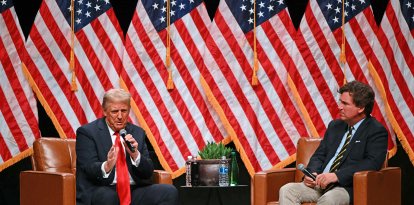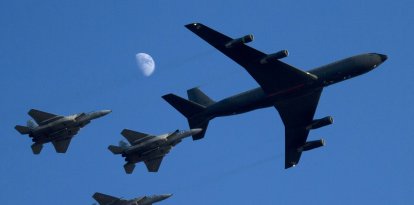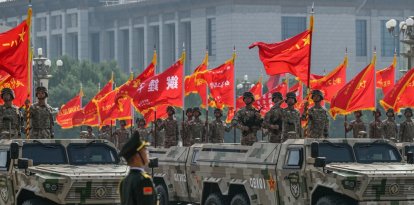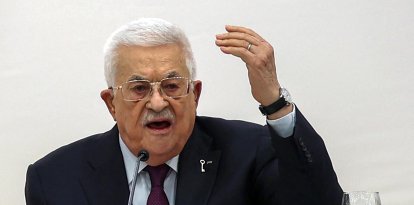War in Ukraine, year three: Between insults and agreements, the harsh reality is looming
According to the government, the United States assumes almost 70% of NATO's total defense spending, this fact becomes a dagger in the side for the administration that is doing its utmost to cut costs.

Zelensky met Trump on october '24
Last week Donald Trump published details of his "long and productive" conversation with Vladimir Putin in the face of one of his campaign promises: to end the Ukrainian war. Conversations with the Ukrainian leader also took place in those hours, although now everything seems to have broken down between Zelensky, who accused Trump of acting uninformed, and Trump who replied by accusing him of being a dictator.
How did we get here so quickly?
As hard as it is to swallow, Zelensky will not have a leading role in the "peace" talks. Ukraine is the defeated country, post-war agreements are not a discussion space for everyone to come out equally satisfied. Although the self-satisfied West has forgotten it, war is neither fair nor just and the one who wins prevails over the one who loses. Even if he is the bad guy. Nor does it look like there is going to be an important place at the negotiating table for European leaders and the rest of NATO.
The times of this war is accelerating and the harsh reality is that there is no easy way out and Europe has no immediate bright future.
Days ago, at the Munich Security Conference, Secretary of Defense Pete Hegseth informed America's allies that the U.S. Administration does not think that Ukraine could join NATO or regain all the territories it lost during the war.
Meanwhile, Vice President Vance gave a historic speech in front of European leaders in which he issued a detailed diagnosis of how the Old Continent had reached its present decadence and had become irrelevant. Some analysts say that Vance was harsh, but the truth is that he was moderate if one considers the pathetic role of the European leadership during this war and long before in all aspects. Geopolitics isn't the only aspect in which the policies of the coddled European elites have failed.
The architects of the failure were angry and called for an emergency meeting in Paris where they took the appropriate photos to illustrate their annoyance. At the same time, in Riyadh the emissaries of Russia and the US were meeting to start drawing up the conditions for the end of the war. Three key points came out of Riyadh: Ukraine would not return to its borders prior to the start of the Russian invasion (let alone Crimea), Ukraine's advances in Kursk would be rolled back, and it would not join NATO. Everything Putin had wished for.
Nothing came out of the Paris meeting, however. Germany refused to even consider a deployment in the conflict. Italy, Spain and Denmark showed reluctance and took a backseat. Poland, which does spend 5% of its GDP on defense, said it was unwilling to deploy troops. The new NATO Secretary General, Mark Rutte, acknowledged that Europe and Canada have not contributed to common defense over the past 40 years. The meeting ended with no concrete commitments. Just a bunch of empty promises about wanting to take things seriously this time, accompanied by a set of toothless sanctions and an evident internal division. In other words, the European leaders were angry at not being taken seriously, but they were unable to come out of the conclave with a single serious decision.
The Trump administration's foreign policy is angering and disconcerting many, but its message is clear: the United States no longer wants to continue paying for the security of a Europe that does not assume the cost of its own defense and that is cheating itself by evading its own sanctions to buy energy from Putin. Trump has in front of him a rich brother-in-law that believes he has a right to raid American taxpayers' refrigerator without consequences. And Trump's duty is not to the rich and injudicious Europeans, but to the American taxpayers that elected him.
Pete Hegseth has already made it clear that there will be no US troops deployed in Ukraine and urged NATO allies to exceed the 2% of GDP target for defense spending, while broadcasting the paltry percentages actually spent by the richest countries on their war machines. France, Germany and Canada have not reached 2%, there are European countries that barely exceed 1% and that situation is not reversed in hours. The United Kingdom, a historic military ally of the United States, has barely enough resources available, the rest of the NATO countries are even worse off and there are reports that the most powerful countries would barely have enough bullets to last a couple of days if they were to enter an armed conflict.
According to the government, the United States covers almost 70% of NATO's total defense spending and this fact becomes a dagger in the side for the administration that is doing the impossible to reduce expenses. How can President Trump cut jobs and federal programs, if on the other hand he almost single-handedly sustains the economic effort of a war on the other side of the Atlantic, while the European neighbors are not even willing to invest 2% of their GDP?
For decades the "European allies" have been passing the bill for their security to Washington, trusting that the US military will protect them. But the new Sheriff in town has found himself in his second term with unmanageable federal spending and larger geopolitical problems far from the Atlantic. The US faces a vital threat in the Pacific, and containing China is its priority.
Washington has accelerated events with the aim of weakening the alliance between Vladimir Putin and Xi Jinping. It may not achieve a breakup, but undoubtedly in these three years the European war had strengthened this relationship to the point of further deepening Russia's dependence on China. The US priority is to end the war in Ukraine to concentrate on containing tensions in the Indo-Pacific and to distance Russia from its most important enemy.
Trump has made it clear that his patience has run out. Europe has treated the crisis with moralistic frivolity, underestimating US determination to focus on its priorities. If European leaders believe that Trump's second term will be like his first, they are wrong. The president is making great changes to the status quo at a dizzying pace and the Ukrainian war is not exception to this.
And therein lies another bitter truth: with its coarse diplomatic moves, the White House is admitting the serious fact that the U.S. is not in the position to face wars on two fronts. Period. The most powerful country in the world can no longer be everywhere and will no longer continue to guarantee the security of a continent that refuses to defend itself.
The coming days will be crucial to define the new order of Transatlantic relations. Beyond Trump's outbursts and seemingly unpredictable moves, the truth is that he is the one who put on the table the clearest and starkest of realities: that this war is lost and the old order has to come to an end.
























